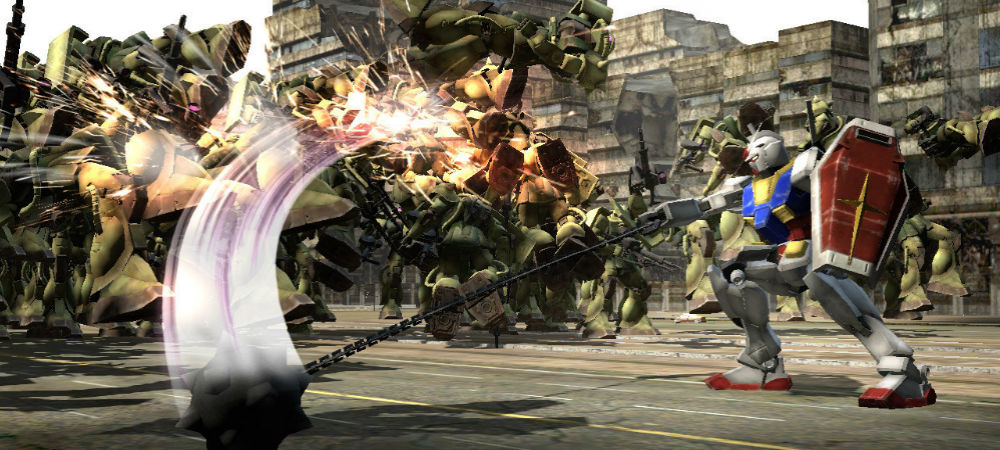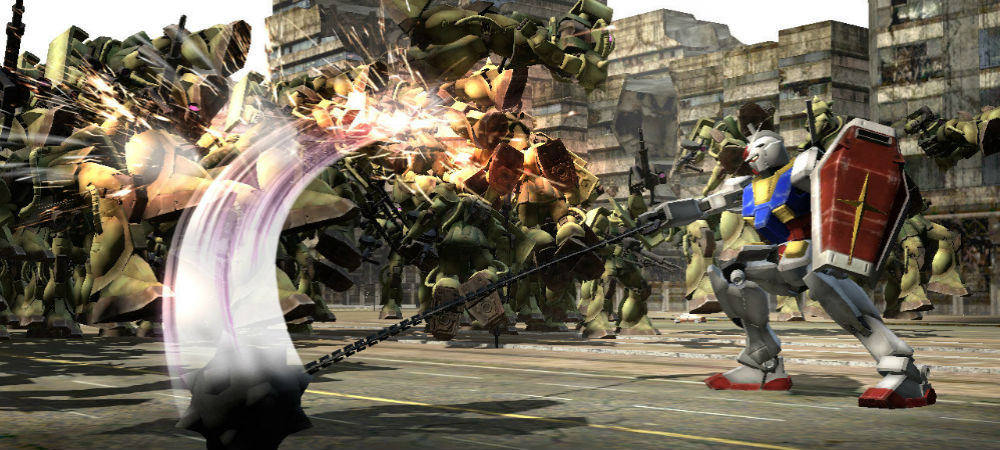Go psycho with Gundams
When I was a kid, I loved watching Gundam Wing and the original Mobile Suit Gundam on Cartoon Network. The mecha genre has always been a personal favorite of mine so I tried to capture the same feeling while playing a video game as I had watching Gundam anime and pretending that I was Heero Yuy or Amuro Ray.
With interest in Gundam on the rise in the US after the Cartoon Network runs, some of the games were finally localized for North America. I thought I’d finally be able to play through the stories I loved so much, picking up Mobile Suit Gundam: Journey to Jaburo as soon as it came out and the disappointment I had in that game resonates with me today. It sure didn’t feel like I was in command of the mobile suit that won the One Year War. I felt like I was in control of a robot-shaped RC car.
Luckily, I was finally able to find the game that would finally reproduce the warm and fuzzy feelings that viewing Gundam for the first time did so long ago, and who would have thought it would have come in the form of a Dynasty Warriors game?

Dynasty Warriors: Gundam Reborn (PlayStation 3)
Developer: Omega Force
Publisher: Bandai Namco Games
Released: July 1, 2014
MSRP: $39.99
Of course, I couldn’t quite discern the quality of the release at a glance. Given the fact that this was my very first Dynasty Warriors Gundam departure, Dynasty Warriors: Gundam Reborn conjured images at first of executives attempting to cash in on the series one last time before the eventual demise of the PS3.
Fortunately, I knew within my first few minutes of evaluation that I was wrong. This game flows so well in every aspect that, despite its eventual repetitiveness, it actually does an excellent job of quenching the thirst of this parched Gundam fan. And while fundamentally there isn’t much in the way of classic Dynasty Warriors-styled battles here to coerce longtime fans of the series, there’s plenty here for a Gundam diehard to get excited about.
Despite being a hack-and-slash adventure of the Dynasty Warriors ilk, there are actually quite a few strategic elements to be found within the game. In the first few missions of each mode you find yourself simply killing enough enemies or capturing enough fields to progress. Later missions find you completing a myriad of objectives at once.In one particular mission in the original Mobile Suit Gundam story mode I found myself with simultaneous objectives, tasked with both rescuing White Base and securing the Jaburo control room. It was times like these I had to check the map and determine the ratio of enemy units to friendly units and make an executive decision as to which objective truly took priority. This lent an interesting lilt to the immersion factor of being in a Gundam on the battlefield and replicated many of the series’ most thrilling moments.
In addition to Official Mode, where you follow the plot outlined in Mobile Suit Gundam, Zeta Gundam, Char’s Counterattack, Gundam Unicorn, Gundam SEED, and Gundam SEED Destiny, there’s Ultimate Mode. Here, you can follow a series of original missions and choose your own pilot and Gundam. I found this to be the more disjointed of the two, with pilots and mobile suits chosen seemingly at random for the stories. Maybe it’s just the purist in me, but I found it odd to see GMs and Zaku IIs fighting for the same side. The Ultimate Mode does add a lot of replay with unique scenarios and several “what-if” scenarios.
The stars of the game are the mobile suits, though, and there are a lot of them. Over one hundred mobile suits and armors are waiting to be unlocked and upgraded. The upgrade system is simple, but can be frustrating, as it’s based on receiving plans and parts. Plans can be used to upgrade the general characteristics of your mobile suit such as melee, armor, thrusters, and more. Parts are used to upgrade your weapons, and the higher upgrades can take massive amounts of the higher-end golden parts to upgrade.

Frustration sets in with the seemingly random nature of receiving parts and plans. It seems like the rule is the higher the difficulty, the better the drops, but I have received Class E plans for 8-star difficulty missions and Class A plans for one-star difficulty. There’s also a collectible card system in which you receive cards for accomplishing certain tasks that also reward you with parts and plans. I personally was playing mostly just to kill giant robots, but these aspects could cause some major headaches for completionists.
Fortunately, while you’re eliminating said giant robots, you can enjoy crisp graphics, which are impressive both for the PS3 overall and how many units are on the screen at once. Each unit is lovingly rendered, although their textures can be a bit plain and muddled. I forgave this as there are hundreds of them rendered at once and the PS3 is a little long in the tooth. The backgrounds are varied and although plain, in my opinion out of necessity for the playstyle, they really give the feeling you’re not playing in the same old arena over and over. Particle effects are also rendered well, be it a beam sword or a funnel bit firing.
The audio, in all honesty, is probably going to be the great divider when it comes to Dynasty Warriors: Gundam Reborn. I love the original Japanese with the English subtitles, but this might turn some off to the game. With it being a budget-priced title I understand Bandai Namco’s decision not to hire a whole new team to translate voice audio into English. However, in the middle of battle it can be somewhat distracting to have to focus on fighting and reading subtitles, which definitely resulted in me missing out on some of the story. The background music, as an aside, is subdued but engrossing. It lends itself well to the pace of the game and is quite reminiscent of the soundtracks to the various Gundam series.

All in all, I was quite pleased with this entry into the Dynasty Warriors Gundam series. However, I’m a Gundam fan and have been for a decade or more. I would have no problem recommending the game to other fans of Gundam or mecha in general, but for players who haven’t heard of either of those things, I’d be hard-pressed to even broach the topic.
Additionally, the entry price for DLC is much too high for what you get and doesn’t add a ton to the game, which was one of its biggest turn-offs. For $30 USD you can get all the DLC, which brings the total up to $70. I purchased it because of my interest in the source material, but I suggest that people mix and match the DLC if interested in purchasing it at all.
While to some (myself included), taking to the battlefield piloting the RX-78-2 Gundam and slaughtering thousands of Zaku and Dom pilots and facing off against Char himself sounds like heaven on Earth, a lot of people just don’t care about that sort of thing. Also, with the emphasis on Gundam SEED this game has, many of the other Gundam series are underrepresented, with the noticeable omission of an Official mode for Gundam ZZ entirely.
It is possible that non-Gundam fans could enjoy this game on the merits of “beating up the bad guy robots” alone, but they’d end up missing out on the charm of what makes Gundam special. I can only hope with the new generation of gaming consoles we’ll continue to see titles like this that are worthy of the legacy of the original IP.









